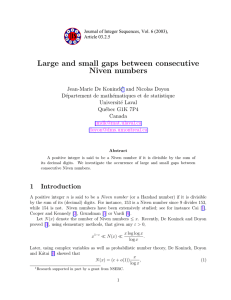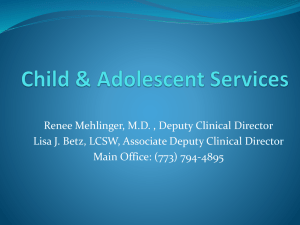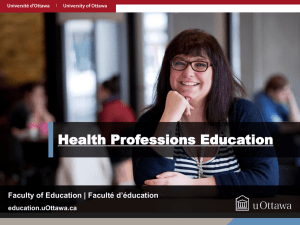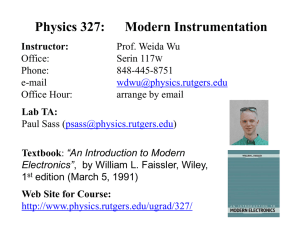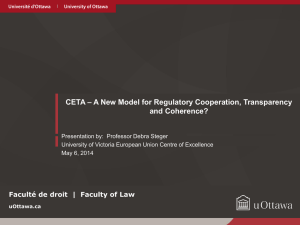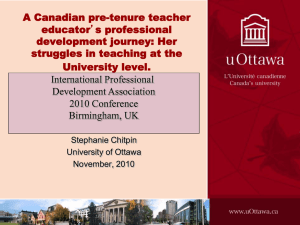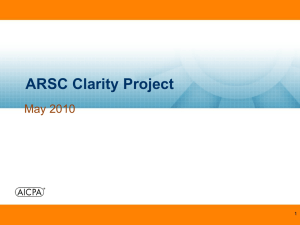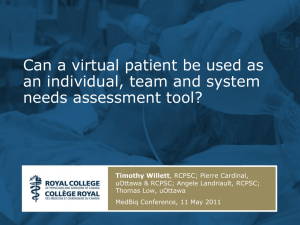ALG2100: Special Topics in German Culture
advertisement
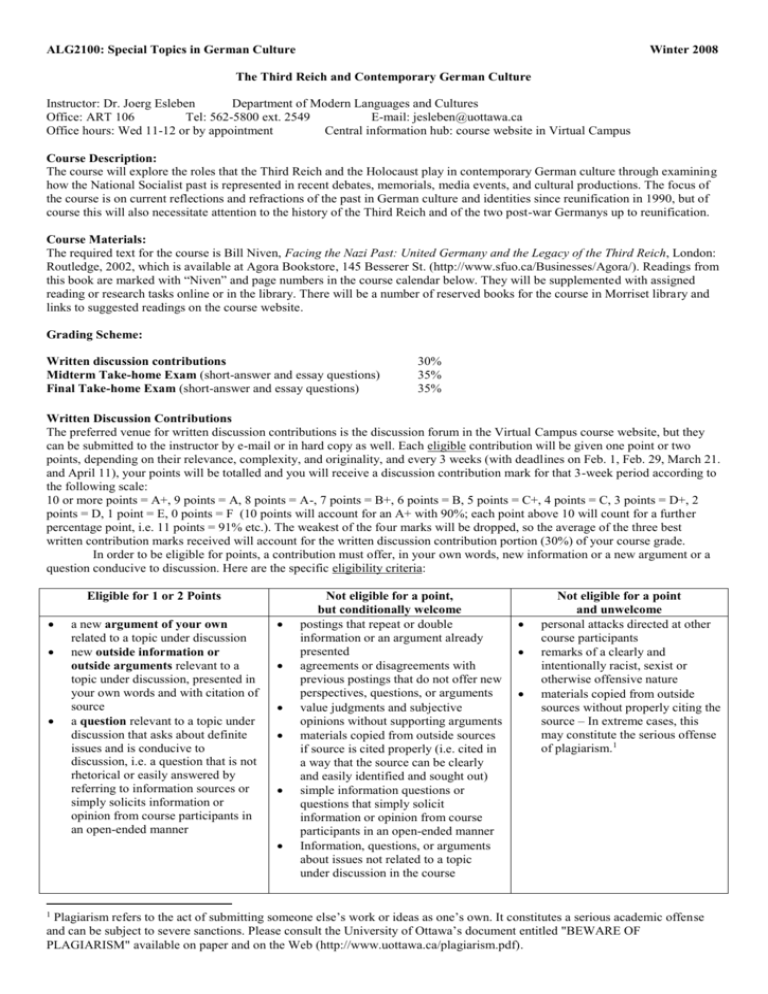
ALG2100: Special Topics in German Culture Winter 2008 The Third Reich and Contemporary German Culture Instructor: Dr. Joerg Esleben Department of Modern Languages and Cultures Office: ART 106 Tel: 562-5800 ext. 2549 E-mail: jesleben@uottawa.ca Office hours: Wed 11-12 or by appointment Central information hub: course website in Virtual Campus Course Description: The course will explore the roles that the Third Reich and the Holocaust play in contemporary German culture through examining how the National Socialist past is represented in recent debates, memorials, media events, and cultural productions. The focus of the course is on current reflections and refractions of the past in German culture and identities since reunification in 1990, but of course this will also necessitate attention to the history of the Third Reich and of the two post-war Germanys up to reunification. Course Materials: The required text for the course is Bill Niven, Facing the Nazi Past: United Germany and the Legacy of the Third Reich, London: Routledge, 2002, which is available at Agora Bookstore, 145 Besserer St. (http://www.sfuo.ca/Businesses/Agora/). Readings from this book are marked with “Niven” and page numbers in the course calendar below. They will be supplemented with assigned reading or research tasks online or in the library. There will be a number of reserved books for the course in Morriset library and links to suggested readings on the course website. Grading Scheme: Written discussion contributions Midterm Take-home Exam (short-answer and essay questions) Final Take-home Exam (short-answer and essay questions) 30% 35% 35% Written Discussion Contributions The preferred venue for written discussion contributions is the discussion forum in the Virtual Campus course website, but they can be submitted to the instructor by e-mail or in hard copy as well. Each eligible contribution will be given one point or two points, depending on their relevance, complexity, and originality, and every 3 weeks (with deadlines on Feb. 1, Feb. 29, March 21. and April 11), your points will be totalled and you will receive a discussion contribution mark for that 3-week period according to the following scale: 10 or more points = A+, 9 points = A, 8 points = A-, 7 points = B+, 6 points = B, 5 points = C+, 4 points = C, 3 points = D+, 2 points = D, 1 point = E, 0 points = F (10 points will account for an A+ with 90%; each point above 10 will count for a further percentage point, i.e. 11 points = 91% etc.). The weakest of the four marks will be dropped, so the average of the three best written contribution marks received will account for the written discussion contribution portion (30%) of your course grade. In order to be eligible for points, a contribution must offer, in your own words, new information or a new argument or a question conducive to discussion. Here are the specific eligibility criteria: Eligible for 1 or 2 Points a new argument of your own related to a topic under discussion new outside information or outside arguments relevant to a topic under discussion, presented in your own words and with citation of source a question relevant to a topic under discussion that asks about definite issues and is conducive to discussion, i.e. a question that is not rhetorical or easily answered by referring to information sources or simply solicits information or opinion from course participants in an open-ended manner Not eligible for a point, but conditionally welcome postings that repeat or double information or an argument already presented agreements or disagreements with previous postings that do not offer new perspectives, questions, or arguments value judgments and subjective opinions without supporting arguments materials copied from outside sources if source is cited properly (i.e. cited in a way that the source can be clearly and easily identified and sought out) simple information questions or questions that simply solicit information or opinion from course participants in an open-ended manner Information, questions, or arguments about issues not related to a topic under discussion in the course Not eligible for a point and unwelcome personal attacks directed at other course participants remarks of a clearly and intentionally racist, sexist or otherwise offensive nature materials copied from outside sources without properly citing the source – In extreme cases, this may constitute the serious offense of plagiarism.1 Plagiarism refers to the act of submitting someone else’s work or ideas as one’s own. It constitutes a serious academic offense and can be subject to severe sanctions. Please consult the University of Ottawa’s document entitled "BEWARE OF PLAGIARISM" available on paper and on the Web (http://www.uottawa.ca/plagiarism.pdf). 1 Course Calendar Wednesday Friday January 11 Introduction / Historical Overview Niven 1-9 January 16 January 18 Historical Overview / Anniversaries Historical Overview / Anniversaries Niven x-xxii and 95-118 Niven x-xxii and 95-118 January 23 January 25 Concentration Camp Memorial Sites Concentration Camp Memorial Sites Niven 10-40 + 41-61 Niven 10-40 + 41-61 January 30 February 1 Goldhagen and Klemperer Goldhagen and Klemperer Niven 119-142 Niven 119-142 Deadline for Discussion Contribution Mark 1 February 6 February 8 Historians’ Debate and Walser-Bubis-Debate Historians’ Debate and Walser-Bubis-Debate Niven 175-193 Niven 175-193 Midterm Take-home Exam handed out February 13 February 15 Holocaust Memorial Holocaust Memorial Niven 194-232 Niven 194-232 Midterm Take-home Exam due February 18-22: Study Break February 27 February 29 Wehrmacht exhibition Wehrmacht exhibition Niven 143-174 Niven 143-174 Deadline for Discussion Contribution Mark 2 March 5 March 7 Resistance Resistance Niven 62-94 Niven 62-94 March 12 March 14 The Bomb War The Bomb War March 19 March 21 Literature and the Past Literature and the Past Deadline for Discussion Contribution Mark 3 March 26 March 28 Vergangenheitsbewältigung in Film and Television Vergangenheitsbewältigung in Film and Television April 2 April 4 Hitler in Film: Fascination and Controversies Hitler in Film: Fascination and Controversies April 9 April 11 Open Topic Open Topic Final Take-home Exam handed out Deadline for Discussion Contribution Mark 4 Final Take-home Exam due on Friday, April 18, 4:00 pm, Arts 106 (hand in or push under door) January 9 Introduction Free services available to students: The Mentoring Centre of the Faculty of Arts is located in room 125B, Simard Building. Student-mentors share with students their University experience (community life, rules and regulations, learning strategies.). The SASS (Student Academic Success Service), established by the University, provides many services (http://web.sass.uottawa.ca/). One of them is the Academic Writing Help Center (AWHC/CARTU) (http://www.sass.uottawa.ca/writing/) located at 110, University. The SASS regularly publishes a list of academic and social activities taking place on campus on its University 101 Web portal. (http://web.sass.uottawa.ca/university101/) The Access Service - formerly called Special Services - helps students with a physical handicap or learning disability. It is part of the SASS. (http://www.sass.uottawa.ca/access/) Services offerts aux étudiants: le Centre de mentorat de la Faculté des arts, situé à la pièce 125B du Pavillon Simard. Les étudiants-mentors partagent avec les étudiants leur expérience universitaire (connaissance du milieu universitaire, règlements, méthodes et stratégies d’apprentissage). le SASS (Service d’appui au succès scolaire) de l’Université offre une multitude de services (http://web.sass.uottawa.ca). Il abrite le Centre d’aide à la rédaction des travaux universitaires (CARTU), (http://web.sass.uottawa.ca/redaction), situé au 110, rue Université. Le SASS a conçu le portail Université 101, qui publie régulièrement la liste des activités scolaires et sociales qui ont lieu sur le campus. (http://web.sass.uottawa.ca/universite101) le Service d’accès - autrefois le Centre des services spéciaux - dispense des services individualisés pour aider les étudiants ayant un handicap ou un trouble d’apprentissage. Il relève aussi du SASS, (http://www.sass.uottawa.ca/bienvenue.php)

